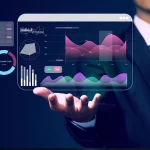
Gearing up for the post-pandemic world with Data Science – an interactive data-driven conversation with Bidhan Roy, Director (Data Science/AI), Business Analytics and Research, Fidelity Investments.
As per the Data Security Confidence Index from Gemalto, around 65% of the companies agreed they cannot categorize or analyze their stored data. Also, 89% of the businesses know that they’d have a competitive edge if they could analyze and categorize data. In another study conducted it was found that 90% of the data across the globe was created within the previous two years. In 2018, the amount of information available globally totaled 33 zettabytes, and projections show an increase to 133 zettabytes by the year 2025.
Data Science, also referred to as the “oil of the 21st century,” carries the importance of digital data in the field. It combines mathematics and statistics, scientific methods, advanced analytics, specialized programming, and artificial intelligence (AI). This multidisciplinary approach extracts valuable insights from the enormous and ever-increasing volumes of collected data. It presents results and benefits research, businesses, and everyday life by revealing patterns to draw well-informed decisions.
Data Science was already having a big moment before the pandemic. The interest peaked further when it took centre stage in battling the spread of COVID-19. Businesses, too, are waking up to the need of being adequately skilled at data acquisition and analytics to combat and grow with what comes next.
In a recent TalentSprint webinar titled ‘Data Science in the Post-COVID World’, Bidhan Roy, Director (Data Science/AI), Business Analytics and Research, Fidelity Investments answered some unique and intriguing questions.
Is there a dip in the demand for Data Scientists post Covid-19 pandemic? What are the objectives of artificial intelligence (AI)? What makes Data Science adoption a must for organizations? How can professionals train and tap such Data Science opportunities? and more. Excerpts.
Data Science in the post COVID world – myth or truth?
Data Science uses large volumes of data to make informed business decisions. It is a study to create new products. Typically, Data Scientists analyze data and find new insights. They help companies to make progress with gathered data. Modern Data Scientists are part mathematicians, part computer scientists, and part trend spotters. They work with advanced machine learning (ML) models and know the technicalities to predict future customer or market behavior based on past trends.
How to gear up for the post-pandemic world with Data Science? Bidhan Roy, Director (Data Science/AI), Business Analytics and Research, Fidelity Investments, shared some interesting views and insights.
The goal of businesses from Data Scientists is to make data-driven decisions for business impact. Demand for Data Scientists is relatively high, with abundant opportunities to evolve. However, with the Covid-19 pandemic, there was a bit of flattening out of the demand. Today, after a few months of the pandemic, there are no signs of a decrease in the demand for Data Scientists and a slowing down of Data Science.
With growing data, the need for data analysis and making sense of gathered data is also increasing. Thus, there is no such thing as Data Science post-Covid. There is a sky-high pay and growing demand for Data Scientists in various companies. It has resulted in an upward career arc.
Expectations from Data Scientists
Data Scientists find data analytics issues, insightful data from big data, solve data problems, and know the current trends to boost business performance at all levels. They must use suitable algorithms or potential modeling techniques to solve business problems, craft experiments, and identify risk areas, issues, and/or opportunities at hand. Identifying business needs and collaborating with stakeholders is a crucial role of Data Scientists.
Challenges in the adoption of artificial intelligence
The impact of artificial intelligence (AI) on the economy and our lives has been astonishing. Applications of AI are countless. Expectation from AI is humanlike, and the AI technologies are classified into sense, comprehend, and act. The machine must sense and perceive the data through audio-visual processing. It must recognize the pattern and understand the information as context or pattern. AI must enable the machine to derive powerful insights that can support action.
One of the significant challenges in the adoption of AI is privacy. AI works on a massive volume of confidential data. This information is often personal and sensitive. Unclear privacy, security, and ethical regulations create a plethora of challenges. In some countries, the General Data Protection Regulation (GDPR) act adds further challenges to the adoption of AI. Plus, AI needs highly skilled and trained professionals. Lack of awareness on the adoption of AI in businesses, infrastructure, technology, and research poses further problems. However, companies and businesses are aggressively adopting AI and trying to diversify it.
Does Data Science have more scope?
The technology-driven 21st century is data-driven. It is one of the lucrative career options in the entire world. There is a high demand and never-ending shortage of Data Scientists. It is a versatile career, and one professional can jump from one role to another. In Data Science, the sky’s the limit.
To enter the vast field of Data Science, professionals have to build new capabilities and gain in-depth knowledge of its practical application in various fields.
 India
India  USA
USA 




